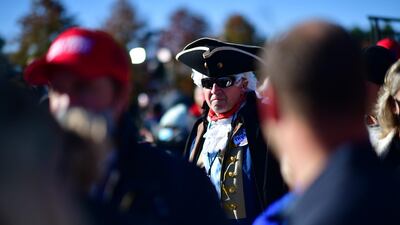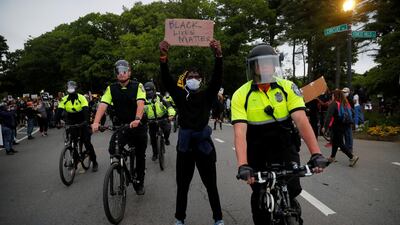This week's US presidential election isn't just between Donald Trump and Joe Biden, but between two visions of what the country is and ought to be – and everything those competing perspectives imply.
So, what's really on the ballot?
First is national self-definition.
Mr Biden embodies the view that the US is, essentially, the expression of a set of ideals, founded to realise enlightenment values of democracy, equality, rule of law and freedom. The corollary is that, whenever possible, Washington should use its global influence to promote these values, particularly over time and in the biggest picture.
Mr Trump, by contrast, is the strongest modern proponent of a very different kind of nationalism, a blood-and-soil nativism reflecting the self-interests of a clearly defined, distinctive people linked by history, ethnicity and culture. Hence his abiding antipathy towards all forms of immigration. Since his worldview flows from a radical distinction between "us" and "them", social diversity is usually regarded as threatening.

















Second is international relations.
Mr Trump calls his approach "America First", but he also clearly views the US as just another country that, like any other, seeks to maximise its competitive advantages. Hence his denigration of traditional partners and alliances, and of any guiding principles in foreign policy beyond narrow, immediate self-interest.
Mr Biden seeks to return the US to an idealistic sense of its own expansive vision, both internally, in pursuit of greater justice and equality, and as a source of order, stability and democratic influence in the world, buttressed by robust immigration. He cultivates a much more fluid sense of where "our" interests and identities intersect or even meld with those of others.
Elements of these conflicting concepts about what the US is and how it should behave in the world have been present since the founding of the republic. But recent developments have forced them into a dramatic confrontation.
In foreign policy, the lack of an existentially threatening and universally accepted adversary such as the former Soviet Union has meant the entire Cold War approach is now up for debate and isolationism is back. The foreign policy establishment has failed to convince ordinary American voters of the benefits of traditional levels and forms of international leadership and engagement, which all too often feels to them like an intolerable burden. That's certainly how Mr Trump portrays it.

















Third is national identity.
Humans are at the beginning of a remarkably thorough and a dizzyingly rapid revolution of life defined by radical new technologies such as artificial intelligence, genetic engineering and nanotechnology. This is clearly going to be more drastic, disruptive and sudden than any analogous past transformation.
The economic components are often mischaracterised as "globalisation", but the reality is far broader. In fact, the way people live and, especially, work, is being dramatically upended, far more quickly than most people can understand or anyone can effectively manage.
That's all very frightening, and encourages tribalism, nativism and the false reassurance of narrow identities.
In the US, it's compounded by a fundamental social shift that began in the late 1960s whereby the traditionally all-powerful white Christian majority becomes far smaller and less privileged, and must share authority with other social groups.

Mr Biden represents Americans who embrace this change as the realisation of founding ideals and a source of social and economic revitalisation. Mr Trump speaks for those who dread these developments and want to fight them tooth and nail.
Mr Biden's America is defined by freedom and democracy. Mr Trump's America is built on the primacy of the white ethnic community, its culture and conservative Christianity.
Fourth is the meaning and significance of democracy.
Mr Trump and most Republicans now openly pursue and defend minority rule. For years, Republicans sought to restrict voting and avoid anything that smacked of an equitable one-person, one-vote system. But they always vociferously denied it.
Such evasions are no longer possible, so they just don't bother anymore. In the current election, having failed to block widespread postal and other forms of mass voting, they are now focusing on intensive and multi-faceted efforts to invalidate millions of already-cast ballots.
Before Tuesday, the astonishing figure of 100 million early ballots will have been cast, in some key states already exceeding the total number of votes in 2016. This is deeply alarming to Republicans.
Mr Trump keeps reiterating that he expects the Supreme Court to secure his victory by disenfranchising huge numbers of American voters through various technicalities. But that would yield an unprecedented crisis of legitimacy.
Hillary Clinton beat Mr Trump by almost 3 million votes in 2016, yet he became President through the federal electoral college system. If Mr Biden secures a significantly larger victory, as seems very likely, but Mr Trump nonetheless remains President, the crisis of legitimacy and structural collapse of democracy will only be matched by the total absence of any practicable legal or constitutional remedies or means of redress – an impossible stalemate.
Fifth is American decline and the prospect of autocracy.
Mr Trump's autocratic manoeuvres consistently intensified during his presidency. His latest, and potentially most damaging, move on government institutions is a new effort to abolish measures protecting the political independence of the administrative civil service.
That would effectively gut 19th-century reforms that began eliminating once-pervasive political corruption and patronage, and resurrect controversies from the 1880s.
But making these jobs political gifts is indispensable to fully realised autocracy. The Republican Party appears to have become a wholly owned subsidiary of Mr Trump's family business. Given another four years, the entire government could follow.
A particularly insightful commentary on what's at stake in next week's election is Richard Byrne's 12-minute online video play, "A Pair of Shoes", which subtly reads current battles over American decay and resurgence through Edward Gibbon's classic 18th-century history, The Decline and Fall of the Roman Empire.
As the play suggests, and millions of Americans obviously understand, the underlying choices on Tuesday’s ballot are extraordinarily clear and consequential.
With most Americans, for once, fully engaged and participating, the US is set to redefine both itself and its relations with the outside world. This election really is that momentous.
Hussein Ibish is a senior resident scholar at the Arab Gulf States Institute and a US affairs columnist for The National


